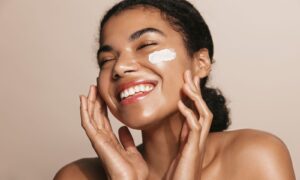In a world where social media influencers flaunt their glowing skin and lavish skincare routines, it’s easy to fall into the trap of believing that the most expensive skincare products hold the key to beauty.
Ads splash across our screens, touting high price tags as synonymous with high efficacy, leaving many consumers convinced that their skin will never reach its full potential if they don’t splurge on that $300 serum.
But what if we told you that the secret to radiant skin might not lie in your wallet?
Join us as we peel back the layers of luxury skincare marketing to reveal an often-overlooked truth: effective skincare doesn’t have to break the bank.
From understanding ingredient efficacy to navigating product formulations, this article will debunk common myths surrounding pricey potions and highlight affordable alternatives that deliver stunning results.
Whether you’re a beauty novice or a seasoned skincare enthusiast, prepare for illuminating insights that could transform your routine without draining your budget!
The Science Behind Ingredient Effectiveness
The effectiveness of skincare ingredients is not merely a matter of price; it’s rooted in scientific understanding and formulation synergy.
Many consumers are drawn to the allure of the most expensive skincare products, often believing that higher cost correlates with superior efficacy.
For instance, certain vitamins can stabilize each other’s potency while enhancing their absorption into the skin when paired thoughtfully.
Moreover, bioavailability—the extent to which these ingredients penetrate the skin barrier—is crucial in determining their performance.
Cutting-edge delivery systems like liposomes or microencapsulation technology can significantly boost this absorption, making even budget-friendly products potentially more effective if formulated intelligently.
Consumers should also consider individual skin types and concerns; what works wonders for one person may yield minimal results for another due to unique physiological responses.
Ultimately, investing time in understanding ingredient science may be just as rewarding as splurging on high-end brands—it empowers individuals to make informed choices tailored to their specific needs.
Marketing Tactics: Luxury vs. Functionality
In skincare, marketing tactics sharply diverge between luxury and functionality-focused brands.
Luxury skincare products often leverage exclusivity as a primary selling point, tapping into psychological triggers that elevate consumer desire.
The most expensive skincare product isn’t just about its ingredients; it’s about the experience it offers—the exquisite packaging, brand narrative, and even the ambiance of high-end retail environments play crucial roles in crafting an aspirational identity that consumers long to associate with.
Conversely, functionality-driven brands prioritize transparency and efficacy, appealing directly to the consumer’s need for results over prestige.
By investing in scientific research and leveraging testimonials or clinical trials, these brands foster trust through demonstrable outcomes rather than opulent visuals.
For them, it’s not merely about being seen as a premium option but proving worth through performance—allowing budget-conscious consumers access to solutions without feeling inferior for choosing practicality over luxury.
This dichotomy reflects broader societal values where status symbols are increasingly scrutinized against real-life benefits.
Ultimately, whether drawn by allure or results, modern consumers are becoming savvier in their choices—demanding both exquisiteness and effectiveness in their skincare rituals.
Affordable Alternatives That Deliver Results
Many consumers equate price with quality, believing that the most expensive skincare product is the only way to achieve radiant skin.
However, many affordable alternatives shatter this myth by delivering impressive results without breaking the bank.
Brands such as The Ordinary and CeraVe have made a name for themselves, offering potent active ingredients—like hyaluronic acid and niacinamide—that rival their luxury counterparts.
What’s particularly exciting is how these budget-friendly options often incorporate innovative formulations that yield visible benefits.
For instance, products enriched with natural extracts or plant-based actives cater to various skin concerns and focus on sustainable practices.
This shift towards affordability challenges traditional notions of prestige in skincare; it democratizes beauty by empowering consumers to make informed choices rather than splurging based on branding alone.
Quality skincare can come at a manageable price; savvy shoppers can achieve their desired results while nurturing their skin and wallets.
Consumer Behavior: The Influence of Price
Price is often viewed as a straightforward quality indicator, particularly in the skincare industry.
Consumers are increasingly drawn to the allure of the most expensive skincare products, believing that a higher price tag equates to superior ingredients or miraculous results.
This perception taps into the psychological principle known as price signaling, where consumers associate cost with value; they assume that if a product costs more, it must be formulated with premium components that justify its expense.
However, this relationship is nuanced—while luxury brands leverage high prices to cultivate exclusivity and status, many affordable alternatives are emerging that rival these premium offerings in efficacy.
As awareness grows about ingredient transparency and informed consumerism, an exciting shift occurs: savvy shoppers start reconsidering their loyalty to high-priced items when comparably effective options come at lower costs.
Social media plays a pivotal role here; reviews and influencers can demystify pricing structures by highlighting affordable solutions that deliver results without breaking the bank.
Ultimately, consumers navigate a complex landscape where price alone doesn’t dictate value—experience-driven choices now dominate buying decisions in an increasingly discerning marketplace.
Smart Choices Over Price Tags
The belief that higher price tags guarantee superior skincare results is a misconception rooted in marketing rather than science.
Many affordable products contain effective ingredients that rival their luxury counterparts, proving that you don’t need to break the bank for healthy, glowing skin.
Additionally, many expensive brands often capitalize on packaging and branding rather than actual efficacy, further perpetuating this myth.
It’s essential for consumers to prioritize knowledge over price when choosing skincare products and to seek out reputable reviews and ingredient lists instead.
So, next time a pricey product tempts you, remember: effective skincare is attainable at any budget—choose wisely!



